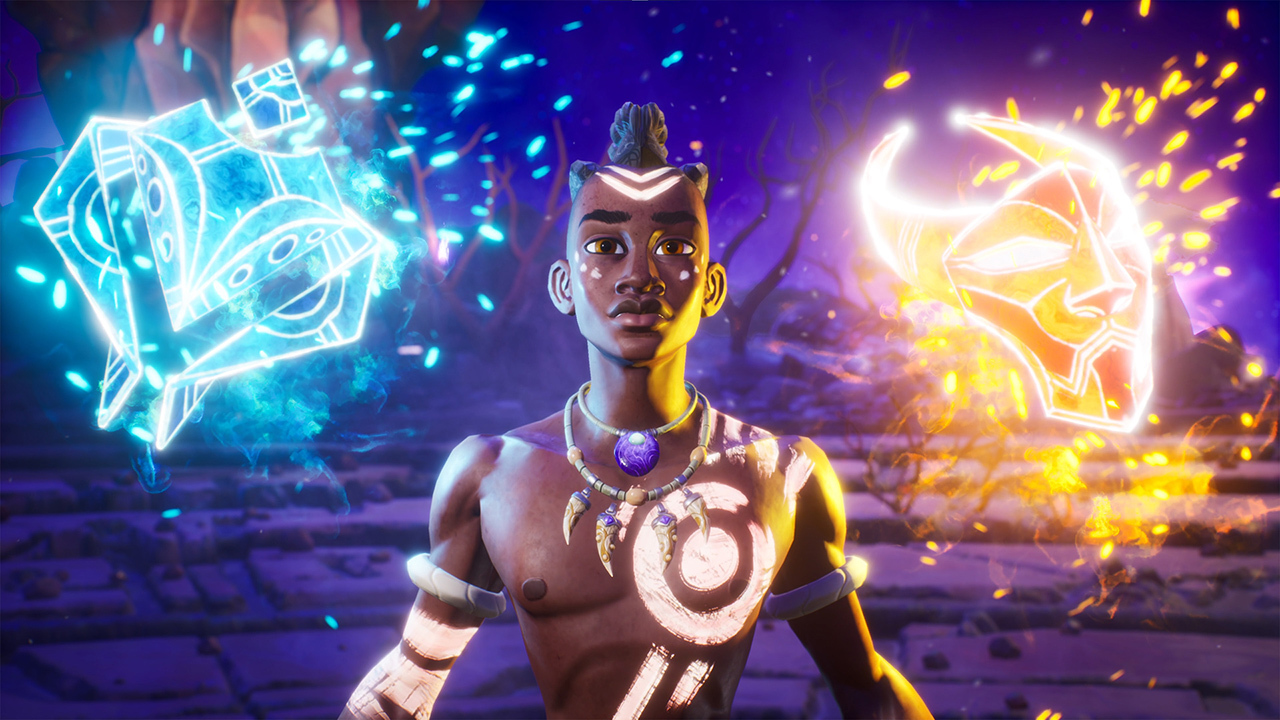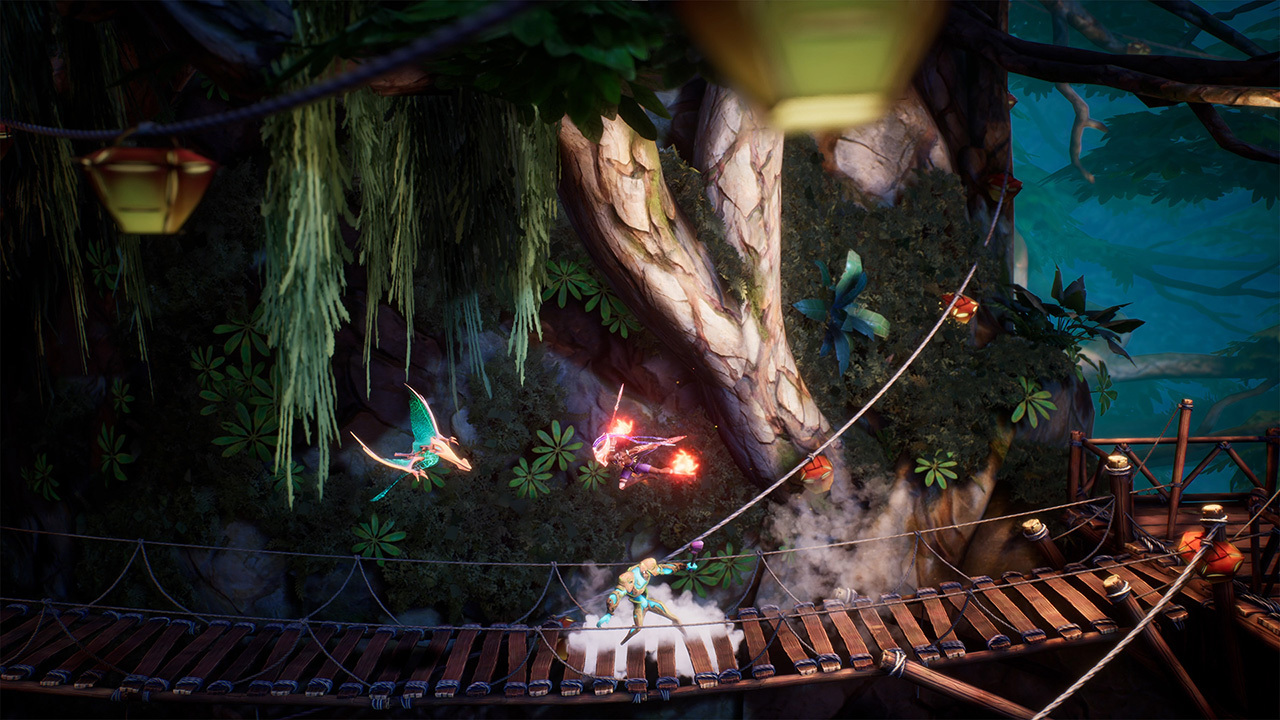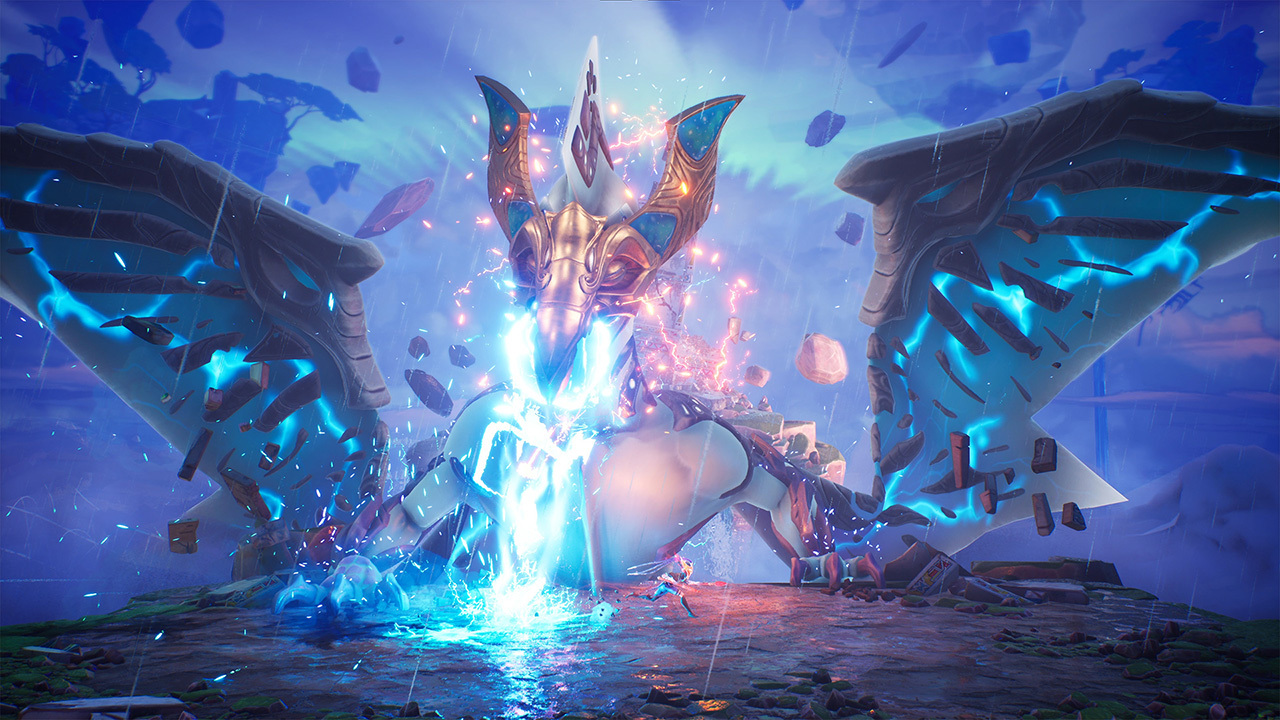Grief is messy. It’s complicated. It’s noisy. Or, at least, that’s how Abubakar Salim described grief to me when we sat down to play Tales of Kenzera: ZAU, the debut game from his studio, Surgent Studios. On the surface, Tales of Kenzera: ZAU is a confident and vibrant 2.5D metroidvania, with an African mystical world as its backdrop. But below its genre foundation, are roots nourished and forged from tragedy. When Abubakar’s father passed away, he said it was like “the rose-tinted glasses were snatched from his face.”
Abubakar was shoved into the depths of grief, navigating a labyrinth of questions he couldn’t answer and emotions he had trouble unpacking. It was noisy and unclear–a feeling that he felt only Tales of Kenzera: ZAU could emulate. “It doesn’t matter if you’ve lost a parent, a brother, a friend, a pet, or a job. Grief is something we’ll all experience, and it’s a journey that we all go through. It’s what makes us all human,” he told me. Hearing him contextualize grief in that way, regardless of what/who you’ve lost, struck a resounding chord for me.

Six months ago, I lost my cat of 14 years, Lili. There isn’t a day that goes by that I don’t think of her. And even half a year later, the smallest thing can trigger a welling of emotions that brings me back to the final moment when I had to say goodbye. It’s gotten easier with time to center myself and become present in the moment, to not get entirely lost in the maze of my emotions and memories, or the sinking reminder that I’ll never see her again, never smell her again, never hear her again. It’s utterly crippling having to go through that maze. Yet as painful as it is, I also don’t want to lose sight of that grief–it brings me back to her. Instead, I want to better understand my way around it. I will likely never come to terms with losing her, but I can at least learn to navigate life without her. Even writing this and trying to find the words to encapsulate that feeling is vague and obtuse. It’s complicated. It’s messy. It’s grief.
For Abubakar, that labyrinth-like feeling of navigating grief isn’t unlike the very tenets of the metroidvania genre–an analogy I understood on paper but hadn’t quite fully grasped until sitting down with Abubakar and playing Tales of Kenzera: ZAU. In its nature, the genre often emphasizes an unknown world, maze-like in design, where dead ends are eventual passageways yet to be unlocked. But the more you explore and persevere past harrowing challenges, the more you learn, and the more you understand how to maneuver the trials around you. None of it makes sense at first, but with time, things will unlock and start to have meaning. In so many ways, it’s about growth.
Tales of Kenzera: ZAU sees its main character, Zau, grapple with the death of his father, and trudge into an African mystical maze in an attempt to strike a deal with Kalunga, the god of death, to bring his father back to life. Despite its considered themes of loss, Tales of Kenzera: KAU strikes an incredible balance in presenting itself as a confident metroidvania in its own right. It allows the game to transcend audiences and invite different interpretations for people at different moments in their lives, which is something I hadn’t quite felt until I sat down to write this preview. It rewards those willing to look deeper into the game but doesn’t alienate players who just want to play a solid metroidvania.

As Zau, I swiftly scaled and ran through the tunnels of Kenzera. I avoided obstacles, leapt from collapsing platforms, wall-jumped past plunging spears, and double-jumped across dangerous pits, ending with an air dodge to close the gap between me and a ledge that hung over a bed of spikes. There was momentum in moving through the moss-covered stone walls, with the occasional sight of a waterfall in the background, and the warm sun bleeding through the cracks above me. As I ventured deeper, I encountered locked paths, areas I’ve yet the skill to reach, and mythical African creatures to battle.
Playing on Nintendo Switch, combat felt intuitive and punchy. On his journey, Zau collects masks that grant different move sets and abilities, and can be changed with a single button press. Wearing one mask, I was brawling up close and personal with foes, smashing through enemies with a flurry of light and heavy combos, dodging behind them, and jumping on and off platforms to avoid their attacks. When an airborne enemy would swoop in, I’d switch to the mask that granted me a ranged attack, firing a spray of needles above.
Performance held up with the Nintendo Switch when it mattered most, like when facing off a horde of enemies, but there were some visual hiccups along the way like textures popping in the background or the occasional frame dip when moving through certain tunnels before entering bigger arenas. Still, the game is expected to release April 23, so there is time to iron those minor details out.
While venturing and dodging and battling my way through Kenzera, I was zoned into the flow and rhythm as with any good metroidvania. It wasn’t until after my hands-on time with the game and chatting with Abubakar that I began to recontextualize my experience with my own journey of grief and even questioned the lengths I would go to bring back a loved one from the dead if the opportunity were presented to me. Being able to play this game and write this preview allowed me to navigate my feelings in a way I hadn’t quite thought of before. Something I haven’t really given myself the chance to do since Lili died six months ago.
For Abubakar, the journey to making this game was a maze in and of itself, not just for finding a means to cope with the loss of his father, but to create a piece of art that was entirely his own. As an actor, Abubakar has stepped into many roles stretching from video games (Bayek in Assassin’s Creed Origins) to television (Father in Raised by Wolves). But despite working in creative fields, he never felt as if he had creative ownership of his work as an actor. “As an actor, you’re a small cog in a massive machine. But making a game, I was positioned to find the beating heart of the entire project and had to listen to it,” he said.
Development began in late 2019, beginning with writing down concepts and mapping out the game. He knew nothing about making a game. “I came in very naive, and I knew I wanted to tell a story that was really personal, that was really real,” he explained. “So I jumped in and said I’m going to learn as I go along. Because, even as an actor, with all your training, you never really learn until the camera is on and rolling.”
Tales of Kenzera: ZAU fits nicely in the resurgence of 2.5D metroidvanias that have come back into fashion the past few years, with AAA studios like Nintendo bringing Metroid back to its roots with Metroid Dread or Ubisoft taking a chance with Prince of Persia: The Lost Crown. From what I played, Kenzera has the leverage to stand right alongside them, and, even more so, for its depiction of truth, and not just Abubakar’s truth, but the truth of everyone. “The human truth,” as he refers to it.
One way Abubakar approached this mantra of the human truth is by using African mythology. When Abubakar was younger, his father would tell him stories of his grandfather who was a Nganga, an spiritual healer. “My father would tell me these wild stories like how my grandfather would go out and talk to spirits and sit under baobab trees, and when I was younger I’d be like, ‘What are you smoking?’ but I eventually saw it as fascinating and beautiful. And that’s something my father shared with me that I wanted to share through this.”


It was an opportunity to not just celebrate his father, but to celebrate his heritage. For Abubakar, using African mythology as the glue for his game’s world and story was a means to inspire a new audience to be excited about history rather than overtly educate them about it.
Tales of Kenzera: ZAU is shaping up to be a solid entry in a warm welcome to this upturn of 2.5D metroidvanias. But its story and emphasis on the journey of not just grief, but in being human, separates it from the bunch in a meaningful way.
Throughout my life, I’ve lost grandparents, I’ve lost an uncle, I’ve lost pets, and I’ve watched loved ones lose their loved ones. Each loss presents its own maze of the unknown, trials to push through, and questions that may never be answered. No loss is harder or easier than the other, but bespoke in their own complicated, messy, and noisy way.
Writing this preview has been cathartic and emotional. It’s been an outlet for me to understand that this journey isn’t over and it may never be over, but the most I can do is persevere and keep going, even if everything doesn’t quite make sense. But, most importantly, while I may be writing this by myself, Tales of Kenzera: ZAU is a reminder that I am not alone. Grief is something we’ll all experience. It’s a journey that we all go through. It’s what makes us human.






















+ There are no comments
Add yours